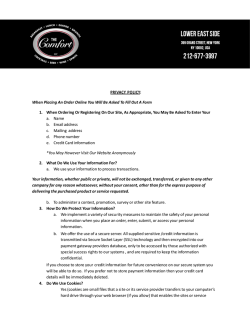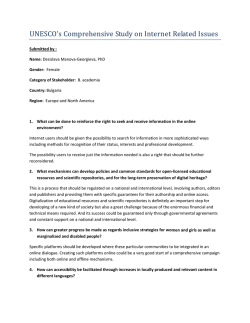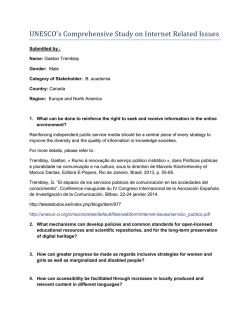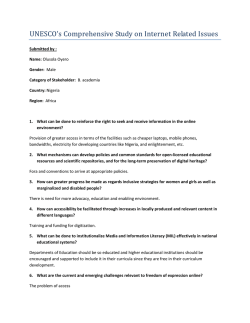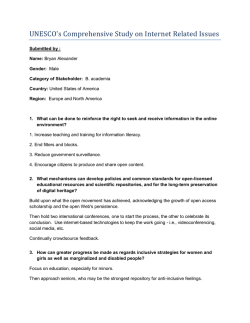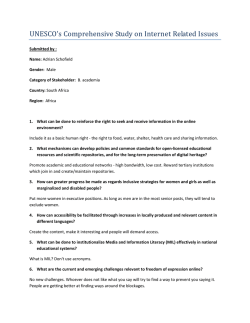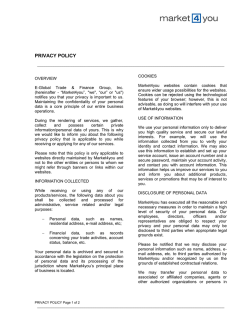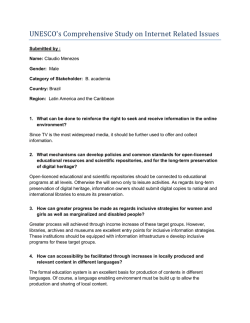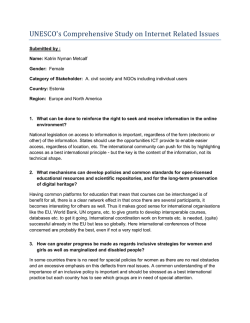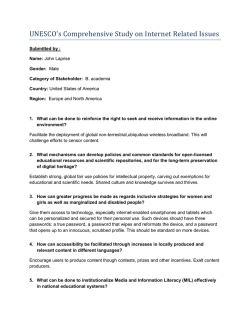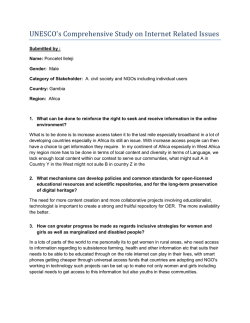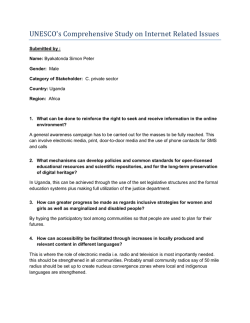
Ignacio B
UNESCO's Comprehensive Study on Internet Related Issues Submitted by : Name: Ignacio B Gender: Male Category of Stakeholder: G. individual users Country: Uruguay Region: Latin America and the Caribbean 1. What can be done to reinforce the right to seek and receive information in the online environment? Non-commercial reproduction and distribution of any work should be unrestricted since the day of publication. Copyright terms should be reduced to 15-50 years after the day of publication. 2. What mechanisms can develop policies and common standards for open-licensed educational resources and scientific repositories, and for the long-term preservation of digital heritage? Publicly funded works should be released into the public domain. Educational and scientific institutions should be allowed to digitalise and publish any related works they have in their archives. 3. How can greater progress be made as regards inclusive strategies for women and girls as well as marginalized and disabled people? Educational institutions should promote the human right to science and culture, no matter the social differences. They should promote the access, creation and use of scientific and cultural works. 4. How can accessibility be facilitated through increases in locally produced and relevant content in different languages? People should be allowed to do a non-commercial translations and distribution of works. 5. What can be done to institutionalize Media and Information Literacy (MIL) effectively in national educational systems? 6. What are the current and emerging challenges relevant to freedom of expression online? Governments and companies are collecting and using personal information for illegitimate activities. Laws are violated to do those activities, moreover, sometimes those illegitimate activities are allowed through law. Governments are collecting and using personal data without transparent judicial control. Meanwhile, companies are also doing that without transparency or government control. 7. How can legislation in a diverse range of fields which impacts on the Internet respect freedom of expression in line with international standards? Internet censorship must be abolished and net neutrality must be enforced, so people can use internet without restrictions by governments or telecoms, 8. Is there a need for specific protections for freedom of expression for the Internet? Human rights protection should be independent on medium. Human rights are universal, so there is no need for specific protections for the internet, but those protections should be applied in the internet. 9. To what extent do laws protect digitally interfaced journalism and journalistic sources? 10. What are the optimum ways to deal with online hate speech? How can Media and Information Literacy empower users to understand and exercise freedom of expression on the Internet? Hate speech must be fought with education, not censorship. 11. What are the optimum systems for independent self-regulation by journalistic actors and intermediaries in cyberspace? 12. What principles should ensure respect for the right to privacy? Laws and authorities should follow the International Necessary and Proportionate Principles. Also, laws and authorities must never punish people for using any measures to excercise their right to privacy and anonymity. 13. What is the relationship between privacy, anonymity and encryption? Encryption is essential for exercising the right to privacy and anonymity. 14. What is the importance of transparency around limitations of privacy? Governments and companies must be transparent with their privacy policies and activities. 15. What kinds of arrangements can help to safeguard the exercise of privacy in relation to other rights? Companies must only collect personal information that they need to provide their products to users. They must never distribute personal information to other companies. And they must delete personal information from their computer systems when individuals tell them to. 16. How can openness and transparency of data be reconciled with privacy? 17. What may be the impact of issues relating to big data on respect for privacy? 18. How can security of personal data be enhanced? Governments must use freely licensed computer systems. 19. How can Media and Information Literacy be developed to assist individuals to protect their privacy? Educational institutions should promote the exercise of the right to privacy. 20. How can ethical principles based on international human rights advance accessibility, openness, and multi-stakeholder participation on the Internet? Internet must be governed through open multi-stakeholder institutions. Their activities must be transparent and open to participation by individuals and civil society. Their goals must be to promote human rights by encouraging the use of internet to allow access, creations and use of cultural and scientific works. 21. What conceptual frameworks or processes of inquiry could serve to analyse, assess, and thereby inform the choices that confront stakeholders in the new social uses and applications of information and knowledge? 22. How does ethical consideration relate to gender dimensions of the Internet? 23. How can ethics, - i.e. the simultaneous affirmation of human rights, peace, equity, and justice - inform law and regulation about the Internet? 24. What international, regional and national frameworks, normative guidelines and accountability mechanisms exist of relevance to one or more fields of the study? 25. How do cross-jurisdictional issues operate with regard to freedom of expression and privacy? 26. What are the intersections between the fields of study: for example, between access and freedom of expression; ethics and privacy; privacy and freedom of expression; and between all four elements? 27. What pertinent information materials exist that cut across or which are relevant to the four fields of the study? 28. What might be the options for role of UNESCO within the wider UN system in regard to the distinct issues of online Access to information and knowledge, Freedom of Expression, Privacy and Ethical dimensions of the information society? 29. What might be options for the role of UNESCO in relation to stakeholders outside the UN system? UNESCO only represents governments, so the institution must not interfer with decisions by multi-stakeholder institutions, but rather promote their activities. 30. For each study field, what specific options might UNESCO Member States consider?
© Copyright 2026
